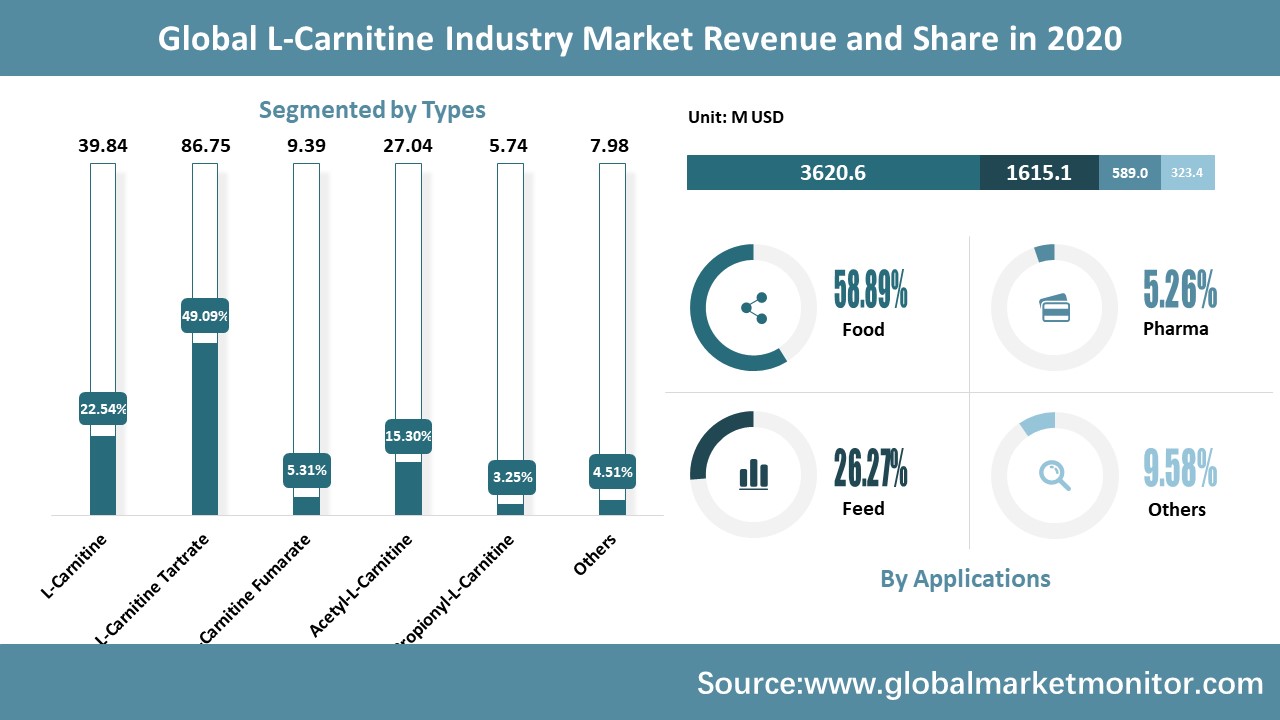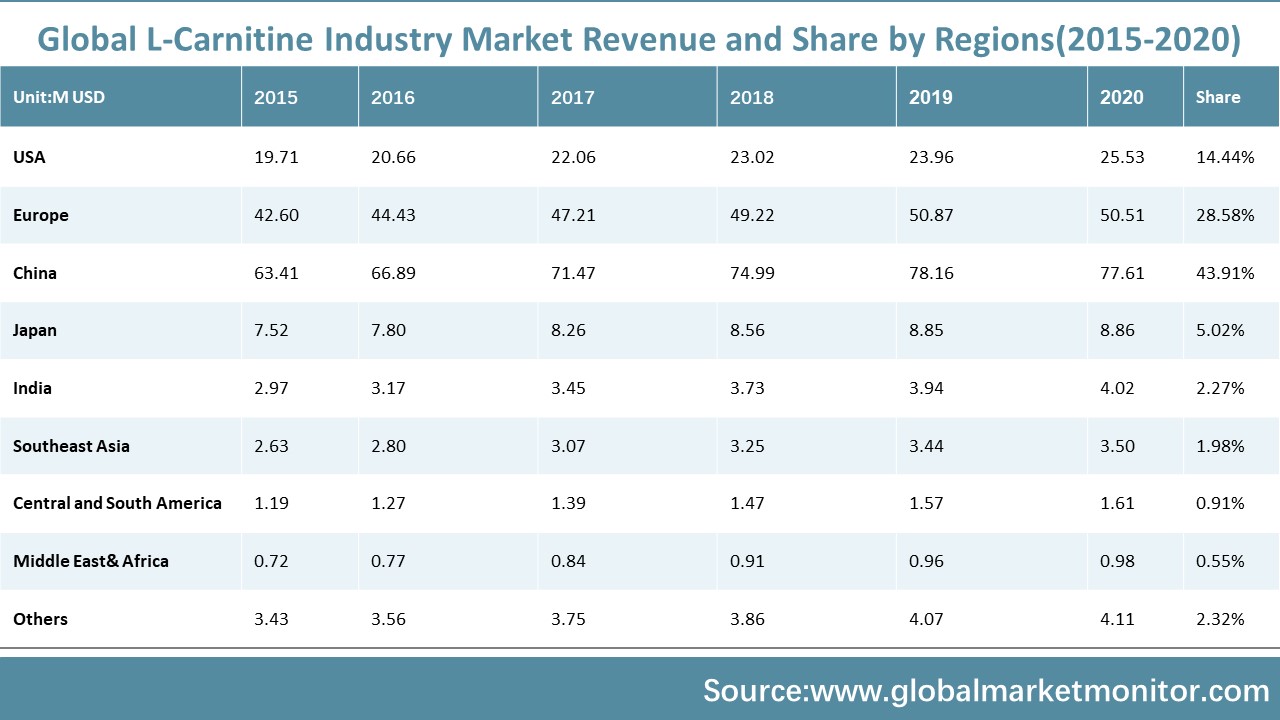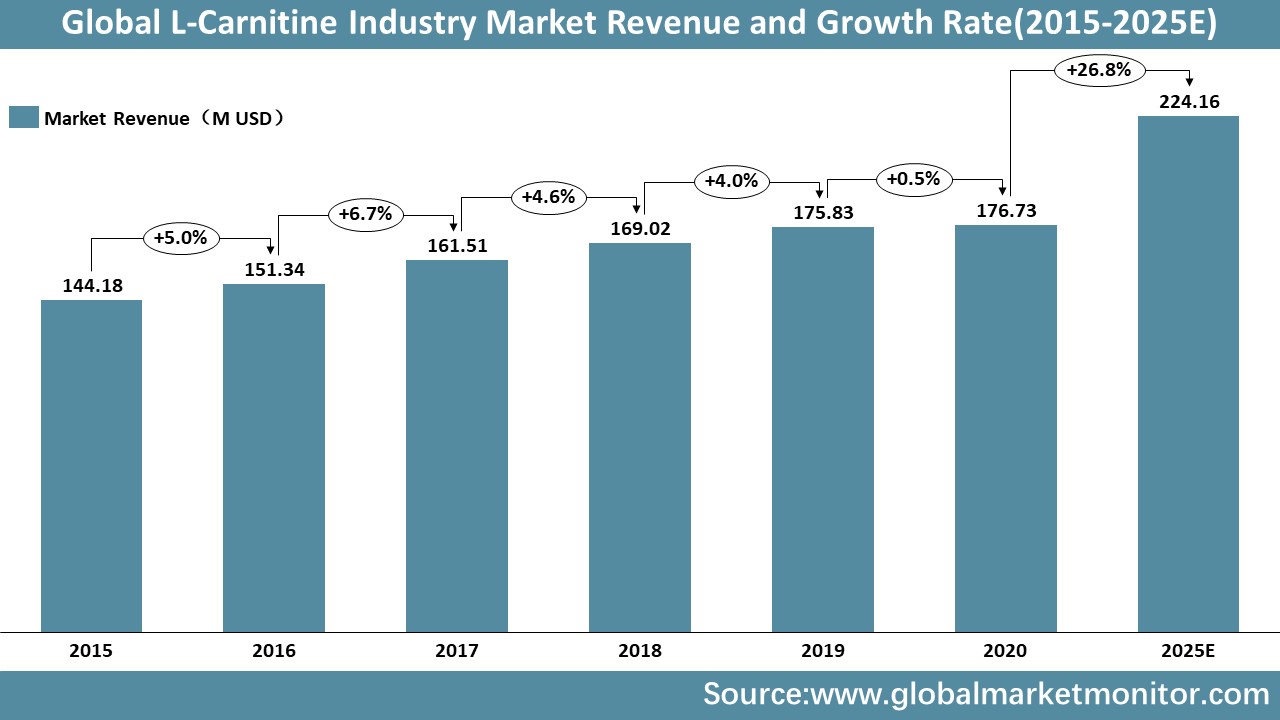L-carnitine accounts for the highest proportion of applications in the food industry
L-carnitine, also known as transliterated carnitine, is an amino acid that converts fat into energy. Red meat is a major source of L-carnitine. L-carnitine is a naturally occurring amino acid substance in the human body. It has the function of transporting fat to mitochondria and accelerating the burning and decomposition of fat, so as to enable consumers to lose weight and slim down without any side effects on human body.
Studies have shown that different types of diets already contain 5-100 mg of L-carnitine, but the average person can only get 50 mg a day from their diet, and vegetarians even less. The main physiological function of L-carnitine is to promote the conversion of fat into energy. Taking L-carnitine can reduce body fat and weight without reducing water and muscle. In 2003, L-carnitine was recognized as the safest nutrition supplement for weight loss without side effects by the International Obesity Health Organization.
From the perspective of downstream application, L-carnitine is the most widely used in the food industry. Data show that in 2020, L-carnitine market revenue share for food field reached 58.89%, accounting for half of the market. In addition, feed grade L-carnitine is also widely used in the feed and pharmaceutical industries as a key ingredient in animal feed and animal medicine. In 2020, L-carnitine market revenue share for feed and pharmaceutical sectors was 26.27% and 5.26%, respectively.

China is the largest revenue market of the global L-carnitine industry, accounting for over 40% of the market
L-carnitine has been widely used in medicine, health care and food, and has been regulated as a statutory multipurpose nutrient by Switzerland, France, the United States and the World Health Organization. The health standard for food additives GB2760-1996 stipulates that L-carnitine tartrate is a food nutrition fortification agent, which can be used in chewable tablets, liquid drinks, capsules, milk powder and milk drinks, and can be used as one of the main components of nutrition food for weight loss. Based on its powerful effect and function, L-carnitine market has developed rapidly in various countries.
Studies show that China is the largest revenue market for the global L-carnitine industry. Data show that in 2020, China\'s L-carnitine market revenue was $77.61 million, with a market share of 43.91%. Second, the European market, with $50.51 million in market revenue, took the second place with 28.58% share. The US L-carnitine market, with a revenue of $25.53 million and a share of 14.44%, ranked the third in the world.

Get complete sample,please click: https://www.globalmarketmonitor.com/reports/1542962.html
Demand for L-carnitine may rise as the number of diabetics increases
Data show that in 2015, the total market revenue of the global L-carnitine industry was $144.18 million, and then it will increase year by year, to $176.73 million in 2020. According to the data basis and development law, we carried out a series of functional operations and derived the data in the next 5 years with a scientific model. Finally, it can be predicted that by 2025, the total market revenue of the global L-carnitine industry will reach $224.16 million.
Diabetes is one of the major global health problems that has reached alarming levels. According to the International Diabetes Foundation (IDF), as of 2019, an estimated 463 million people worldwide were living with diabetes. The global prevalence of diabetes is expected to increase to 578 million by 2030 and 700 million by 2045. L-carnitine is an amino acid that converts fat into energy. Individuals take L-carnitine mainly to increase the level of L-carnitine in the body. Studies have found that proper intake of L-carnitine is effective in a variety of conditions, including severe kidney disease, an overactive thyroid, pregnancy complications, and heart and blood vessel stress. Proper intake of L-carnitine supplements can alleviate obesity-related conditions such as diabetes, high blood pressure, heart disease, and stroke. Therefore, as the number of people with diabetes increases, so will the need for L-carnitine-related drugs.
The body cannot naturally synthesize carnitine in people with genetic disorders, and L-carnitine plays an important role in meeting the body\'s energy production needs because it is involved in the energy production of long-chain fatty acids into the mitochondria. The U.S. Food and Drug Administration has approved the use of (IV) L-carnitine for the treatment of primary and secondary L-carnitine deficiencies. L-carnitine supplements are also used to treat L-carnitine deficiency due to L-carnitine malabsorption and chronic renal failure. On the other hand, the widespread use of L-carnitine supplements has increased the consumption of L-carnitine supplements due to end-stage carnitine deficiency due to kidney disease caused by dialysis. In addition, the benefits of L-carnitine in improving endurance, aiding weight loss and promoting efficient food switching are expected to drive L-carnitine consumption during the forecast period.
Manufacturers focus on research and development activities to reduce the complexity of manufacturing technology and product differentiation. Leading manufacturers such as Lonza and Sigma Tau Group have patented their manufacturing processes. The production of L-carnitine through chemical synthesis has reached industrial scale. However, manufacturers prefer to produce with biological processes because it produces higher yields and less waste than chemical synthesis. In addition, the complexity of the L-carnitine manufacturing process and misleading advertising campaigns touting the benefits of the product are expected to hinder market growth. The industry is also expected to face regulatory restrictions due to the amount of waste and wastewater generated during manufacturing.
Second, companies involved in the production and export of L-carnitine follow strict standards, such as current Good Manufacturing Practices (CGMP), health Standard Operating Procedures (SSOP) and ISO standards. Companies offering food grade products must be certified kosher and halal. This adds to the complexity of administration and also increases labor costs.
For some small and medium-sized enterprises, if the company\'s main customer reduces or terminates the cooperation with the company, or the customer\'s own business difficulties occur, it will have a certain negative impact on the company\'s sales. Large and medium-sized pharmaceutical enterprises, due to the need to comply with the provisions of GMP, in the purchase of raw materials will generally carry out a long-term investigation of suppliers, and pay special attention to the raw material suppliers of product quality control level, so often maintain the stability of raw material suppliers; Therefore, for some companies with limited capacity, it is still necessary to actively develop high-quality customers and reduce the risks to the company\'s operation.

Get complete sample,please click: https://www.globalmarketmonitor.com/reports/1542962.html
